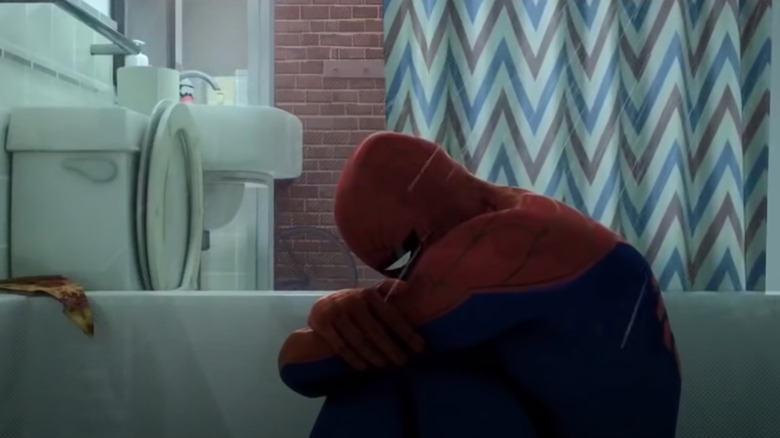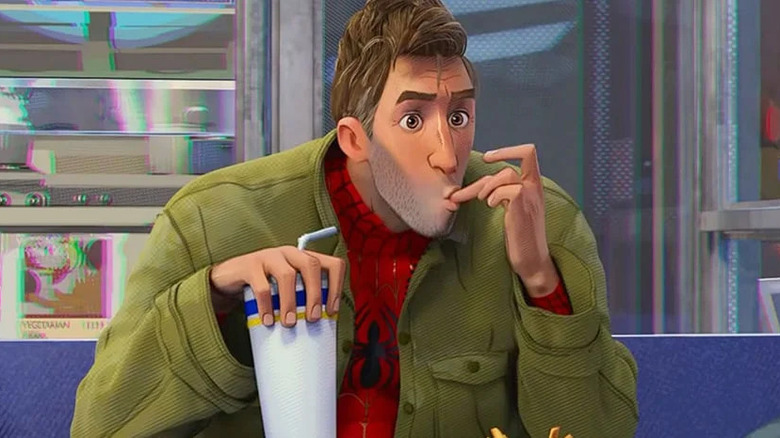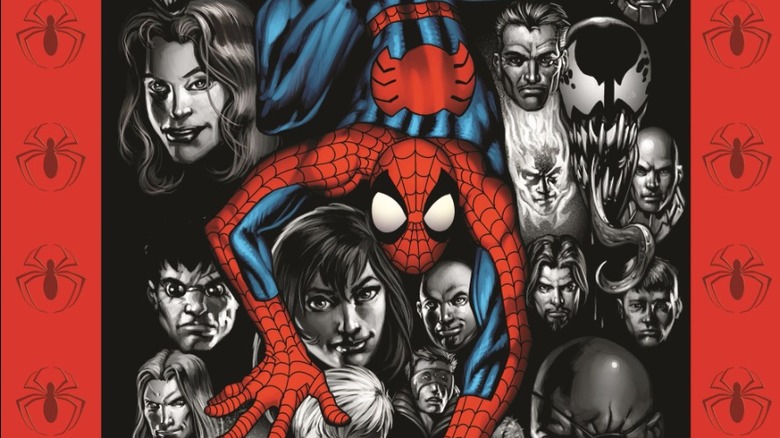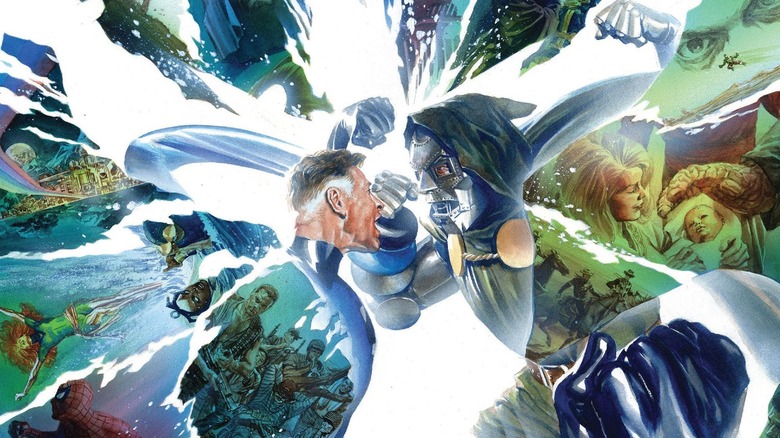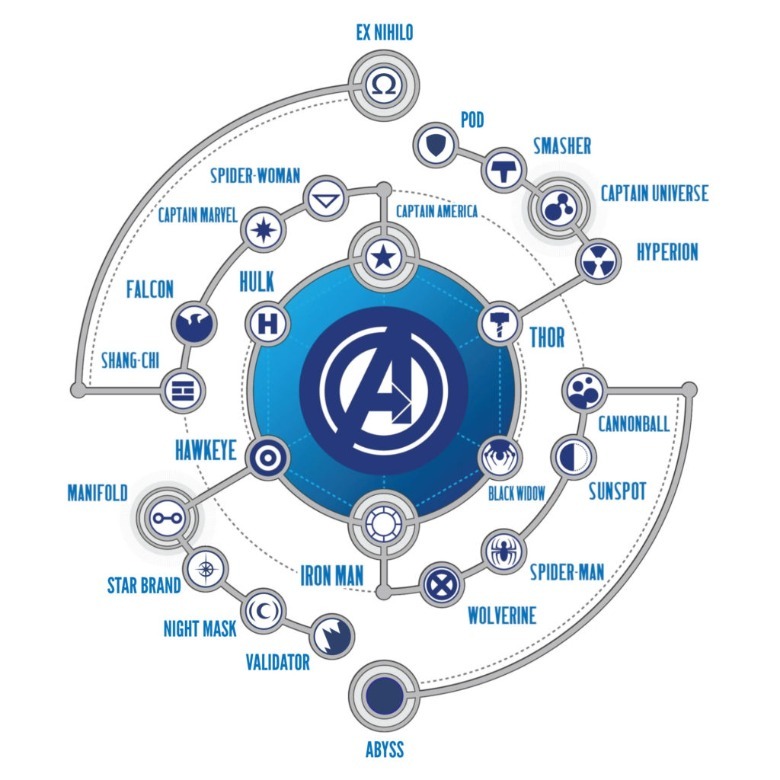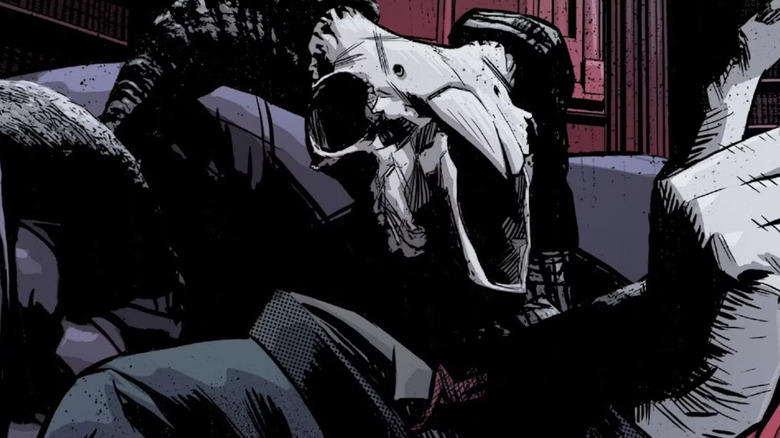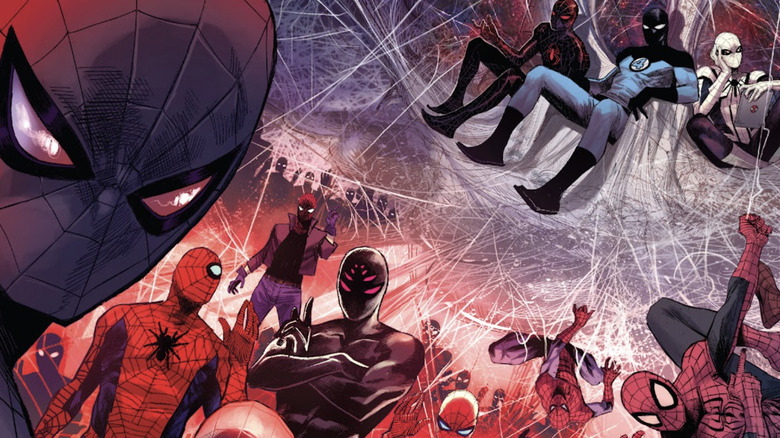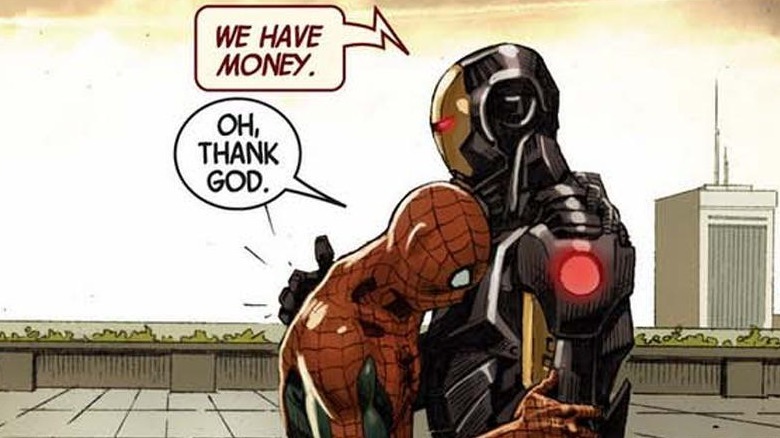The Spider-Verse's Peter B. Parker Is Getting A Midlife Crisis Marvel Comic
Even as superhero movies took Hollywood and the box office by storm in the 2010s, it has proven difficult for fans of those movies to get into the source material comics. If you're a Spider-Man fan eagerly waiting for "Beyond The Spider-Verse," though, pay attention to a new comic swinging its way to stores in January 2024. It will be the easiest jumping-on point for you in a long while.
That comic is "Ultimate Spider-Man," first announced via Marvel's Twitter account on September 20, 2023. It will be an ongoing series written by Jonathan Hickman and drawn by Marco Checchetto. The talent involved was already enough to pique comic fans' interest (and we'll explain why it should rouse yours' too soon). More details about "Ultimate Spider-Man were confirmed at New York Comic-Con this past weekend — at a panel attended by comics outlet AIPT, Hickman said the comic will be about a middle-aged Spider-Man, dubbing it "Ultimate Peter B. Parker."
That middle initial is very important and indicates how Hickman might be writing the character. The reason why lies in the Spider-Verse.
Peter B. Parker
Peter B. Parker, voiced by Jake Johnson, has appeared in both the "Spider-Verse" movies. He's a Spider-Man from an alternate dimension, at least from the perspective of protagonist Miles Morales (Shameik Moore). As for that middle initial — Peter Parker's middle name has traditionally been "Benjamin" in the comics (that's why his clone started going by Ben Reilly). Here, though, it doubles as wordplay; this Peter is literally a B-copy since the Peter Parker of Miles' universe died.
What sets him apart from Peter "A" is that Peter B.'s life is in the dumps. He's middle-aged and shows it with a beer belly. His Aunt May died and he divorced his world's Mary Jane. Across the first film, he and Miles teach each other how to be Spider-Man; Peter uses his experience to train Miles to be Spider-Man, while their friendship reignites Peter's heroic spirit. By the sequel, he's back together with MJ and they have a baby daughter, Mayday.
It should be clarified here that Hickman's Peter B. Parker will not literally be the same character as in the films. He will simply be written in the same mold, a middle-aged Spider-Man who is (presumably) down on his luck. Both the films and this comic stand as a refutation of the current mainline "Amazing Spider-Man" comic, where Peter is in arrested development and kept apart from MJ by editorial fiat. Why won't Marvel won't let Spider-Man grow up? It ties in with why the title "Ultimate Spider-Man" bears significance.
Ultimate Spider-Man
At the turn of the millennium, Marvel launched the new "Ultimate Marvel" comics line. The books took the company's superheroic characters and placed them in a more contemporary setting, with new issue #1's. The thinking was that they could hook new readers without sacrificing decades of history in a full-scale reboot.
Kicking off this line was "Ultimate Spider-Man," written by Brian Michael Bendis and drawn primarily by Mark Bagley. With slick decompression (a comic style emphasizing individual moments over narrative progression) and punchy dialogue in the vein of "Buffy" (Ultimate MJ has a pin-up of Angel in her room), "Ultimate Spider-Man" was a hit.
Unlike "mainstream" Spider-Man (who'd been an adult since the 1970s), Ultimate Peter Parker remained a teenager during the entire comic. Spider-Man first took off because he was a hero who many comic readers (young, possibly socially ostracized boys) could relate to. In turn, he grew up with them. To hook new young readers, Marvel brought back a teenage Spider-Man. Once the kids who read "Ultimate Spider-Man" in the 2000s started growing up, Bendis and Bagley ended Peter's story in "The Death of Spider-Man." Then, Bendis and artist Sara Pichelli restarted "Ultimate Spider-Man" with Miles Morales as the lead (sensing the origins of "Spider-Verse" here?)
Ultimate Peter eventually came back and drove off into the sunset with MJ, but it seems the new "Ultimate Spider-Man" won't pick up from there. Hickman and artist Bryan Hitch's recent mini-series "Ultimate Invasion" established this new "Ultimate" universe is different from the old one. Indeed, the original "Ultimate Spider-Man" was about a teen Spider-Man as counter-programming to the mainstream adult one. Now, the situation has inverted itself and the aged Spider-Man is the alternate take — just in time for the original "Ultimate Spider-Man" readers to be middle-aged themselves.
Who is Jonathan Hickman?
Now, let's talk about the man at the helm of this project. Jonathan Hickman is the man who killed the Ultimate Universe — and then brought it back. To be clear, Ultimate Marvel had largely declined by the 2010s, and ending it was a business decision as much as anything else. However, Hickman did write the setting's last story with his and Esad Ribić's 2015 crossover, "Secret Wars" (popular elements like Miles were spared and brought over to mainstream Marvel).
He's also Marvel Comics' crown jewel of a writer these days. With "Ultimate Spider-Man," he'll have written all four of the publisher's major franchises (Fantastic Four, Avengers, X-Men, and now Spidey) on an ongoing basis. What makes his comics stand out? They're dense, throwing tons of information (both narrative and themes) at the reader, which makes close reading and second looks a necessity. Adding to that, his comics inter-splice traditional illustrated pages with graphs and pages of pure text written like journal entries.
As Hickman told it to Entertainment Weekly, this allows him greater control over information and audience reaction across the fairly limited number of pages per issue in a comic.
"I've always played with the idea of what is narrative and what isn't. If narrative is all art and words, then graphic design is a part of it as well [...] Any time you can disrupt the mechanism by which people read the books by engaging a different part of their brains, they have to work harder and it makes the reading experience more effective just by being different [...] It allows me to cheat narratively [too]. I can do a more cinematic book if I'm not robbing the reader of information in the interim pages."
Hickman's storytelling
As for the stories that Hickman tells, he's drawn to how "great men of history" form cabals and wield institutional power to reshape everything from nations to multiverses. My personal favorite comic of his, "The Black Monday Murders" (drawn by Tomm Coker) presupposes that capitalism is the ritualistic worship of Mammon and that financial crises are the global elite's sacrifices to their vile god. His and artist Nick Dragotta's sci-fi western "East of West" is about power struggles between the seven nations that make up an alternate, shattered America. Circling back to Marvel, Hickman's "Avengers"/"New Avengers" is ultimately about the Illuminati trying to stop the multiverse from collapsing in events called Incursions.
He's not a cynic, though. "East of West" builds up to an apocalypse (the four horsemen are some of the lead characters), but in the end, it's averted. The series ends with Babylon, the son of the Horseman Death, seeing the world with his own eyes for the first time and declaring that it's "beautiful." The culmination of Hickman's "Avengers" epic, "Secret Wars," ultimately refutes the story's earliest observation that "everything dies." No, everything lives and the book ends with Doctor Doom, the villain of all villains, joyously laughing.
Hickman's Spider-Man
Hickman's "Ultimate Spider-Man" sounds like a smaller and more personal story than what he usually writes. However, his habit of finding optimism in dark times fits Spidey's own outlook.
There were rumors he would write the main "Amazing Spider-Man" title a few years ago. However, the job ultimately went to Zeb Wells. Hickman does have a few Spider-Man stories on his resume though. Spidey was a supporting character in both his "Fantastic Four" and "Avengers" runs, the latter giving us this always hilarious panel:
He also recently contributed to the anthology issue "Amazing Fantasy" issue #1000 (referencing the comic title where Spider-Man debuted). Hickman's story, drawn by Checchetto, is titled "You Get It." Peter talks with his other selves from across the Spider-Verse, asking for advice since his life never goes right. Their pep talk is about reminding him who he chooses to be and the good he does: "You choose to put yourself in the center of the storm every day, Peter ... so complaining about the wind won't do you any good."
That brings us to the other reason to look out for "Ultimate Spider-Man" — Checchetto is a great superhero artist. He excels at both dramatic poses and dynamic action. His character drawing skills remind me of the famed Jim Lee but with a grittier presentation (he tends to leave his hatch lines visible). Checchetto's recent work on "Daredevil," written by Chip Zdarsky, is worth reading too.
"Ultimate Invasion" features a Peter who didn't get his power-inducing spider bite as a teenager. Is that Hickman's set-up for the delayed origin of Peter B. Parker in "Ultimate Spider-Man"? We'll have to wait and see.
"Ultimate Spider-Man" will be available in January 2024.
